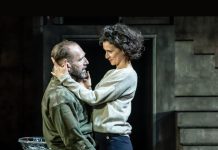The latest offering in Ebenezer Maxwell Mansion’s popular Victorian Theatre presentations is a new interpretation of Anne of Green Gables, playing for four performances this weekend in the 19th-century house-museum’s ornately furnished parlor. Adapted from Canadian author Lucy Maud Montgomery’s best-selling novel of 1908, the play, appropriate for all ages, follows the uplifting story of an eleven-year-old red-haired orphan through her spirited adventures of growing up in the small fictional town of Avonlea, Prince Edward Island. Though she had been sent there in error by her orphanage to live with the unmarried aging siblings Matthew and Marilla Cuthbert – who had requested a boy, not a girl, to help on their ancestral farm – she makes her way in the new surroundings, while remaining optimistic about life and the future.
At the final dress rehearsal before the opening, I had the opportunity to chat with the show’s Director and the program’s Creative Director Josh Hitchens, cast members Molly and Megan Edelman (real-life sisters who play the titular Anne Shirley and her “bosom friend” Diana Barry), and the Mansion’s Executive Director Diane Richardson about the current production and the ongoing series.
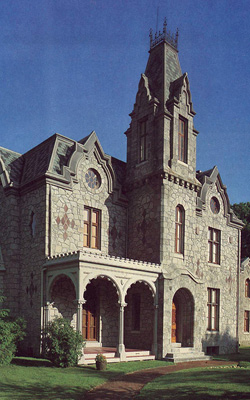
Deb: When and how did the concept of creating Victorian Theatre at Ebenezer Maxwell Mansion originate?
Diane: The concept was really Josh’s, and it was groundbreaking at the time in Philadelphia. I think we were the first historic house here to present site-specific theater on a regular basis, though several other sites are offering performances now. Many visitors come to the house because of it, and we’ve been able to launch the careers of some talented young actors, like Christina Higgins. But Josh is the concept guy, I just smile and nod at his great ideas!
Josh: I started working here in 2008, as a writer and director for the annual “Murder Mystery” shows. Those were well received, so Diane and I started talking about doing a regular schedule of performances. We founded the Victorian Theatre in 2010, though we had been doing shows for a few years before that, and had already started theming them to fit the period of the house.
What are the advantages and challenges of adapting a well-known classic for staging in one room of an historic house, rather than on a traditional stage?
Josh: A big part of the challenge with Anne of Green Gables, and with Little Women in 2016, was that it’s so beloved, I had to stay completely true to the story and what people remembered from reading it as a child. Plus the literary structure of Anne is essentially episodic, so it was important for the play to have a narrative flow, not just a string of incidents. Working in one room can be difficult for some scenes; for example, in Anne there are episodes with outdoor settings and bodies of water. But the advantage is that it allows the actors and the director to engage the audiences, to transport them to the different locales by using their imaginations, to make them visualize the settings through the author’s words, the cast’s movements, and the specific props we use.
Diane: The setting is so special, you couldn’t get this anywhere else or recreate it on a traditional stage for a reasonable budget. And it’s also important to encourage people to use their imaginations, especially now, at a time when everyone is obsessed with digital devices and they can pull up everything on a little screen. Those are the great advantages of presenting shows here. The biggest challenge, as the guardian of the house, is telling people not to touch anything in the collection and not to sit on the furniture! But Josh is extremely respectful and takes great care to ensure that nothing is damaged.
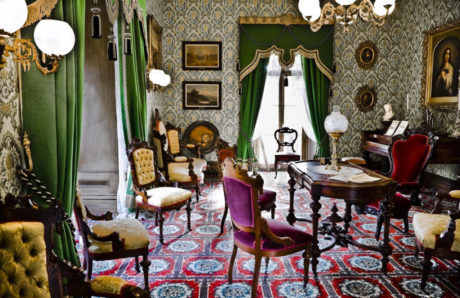
How does the setting impact your performance?
Megan: That’s a great question. Because most of the theaters we work in are either a black box or have a proscenium stage, there’s always a sense of distance or separation from the audience. On stage you’re removed, and so you’re more aware that you’re acting. Here in the house, we’re very close to the audience, in the same room, on the same level, so it feels more natural and integrated.
Molly: The space is so beautiful and intimate that it feels like we’re performing with the audience, and for them, not to them. It also keeps us on our toes, because we’re all so close to each other.
Diane: People feel at home in our living room. We’re bringing literature to life. I often say to Josh, “I get paid for this?!” It’s a dream come true for me.
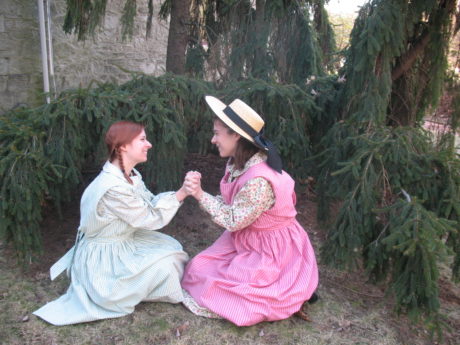
Why did you choose Anne of Green Gables for presentation in the series?
Josh: It started with Little Women. We had never done shows for all ages before, so that was a departure for us. It was very different for me – the complete opposite of my usual specialization in mystery and horror – and I loved it. Also, we had been doing all male authors, like Charles Dickens and Henrik Ibsen, and realized that we were ignoring the women, so we wanted to correct that. I had read Anne of Green Gables as a child, and when I saw Molly in costume for Louisa May Alcott’s Little Women last May, I saw her as Anne. She has red hair, and, knowing what she can do as an actor, she seemed perfect for the part, so the idea to do this all started with her.
Diane: We’re bringing in a young audience, and for them it could be life-transforming, to be introduced to the theater at an early age. We’ve had families coming in from as far away as Louisiana to see our shows; the adults have great memories of these children’s classics, and they want their kids and grandchildren to experience them.
Josh: Yes, we’re hoping that lots of people will bring their kids.

Though the book was written in 1908, are there any themes or morals in it that are especially relevant for today, and always?
Josh: One thing that’s very important to me is that it embraces the possibility of what using your imagination can give you. It’s a celebration of that – to imagine and to create stories, as Anne does. Also, there are characters who tell Anne that she doesn’t need to study or to go to college, because that’s not for girls. Unfortunately that’s still an issue for many people, and for that time it was very unusual for a girl to be first in her class and to win academic awards. But Anne’s response about not having to be good in school or to go on with her studies is, “I never believed that.”
Diane: It gives hope. I was a homemaker for 20 years, with a B.A. in Home Economics, and I needed to reinvent myself. I sometimes had thoughts that I couldn’t do it, but I did, and you can, and it’s good for people to see that even in Victorian times, Anne did it.
Josh: Also the issue of being mean, teasing, and bullying comes up so often today with young people. But for Anne, even if people pick on you, find loyal friends and a family that supports you, and stand up for yourself – which she does at eleven years old! She’s a great role model, she doesn’t let anything crush her spirit. She still sees the beauty in the world, no matter what happens.
Diane: And she’s from a horrible background, growing up as an orphan, having lost both of her parents at such a young age.
Megan: She comes from an orphanage, her life has been so hard, but she creates and imagines better things, gives beautiful names to everything she sees and loves, and then begins to find her place in the world. She discovers her people – the ones who truly care about her. That helps her, and it still helps now, in our age of cyber-bullying, to find the people who give you the love and support you need.
Molly: Definitely the feminist twist is also very relevant today. Anne stands up against her nemesis Rachel; she’s strong, and won’t allow herself to be insulted or bullied, or to be told that she doesn’t need to do well in school or to have a career.
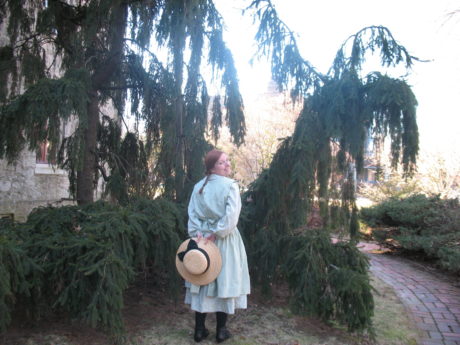
What do you love most about your character and the story?
Molly: She’s such a free spirit with a great imagination. We can all use that, but it seems to be going by the wayside in our digital world, so I hope people who see the show are inspired to imagine.
Megan: For my character Diana, I love that she’s so open. She’s had to take on a lot of responsibility at a young age with her siblings, so when she meets Anne, who helps her, she is ready and willing to have a “bosom friend” to love.
What are the benefits of performing in the show with your sister?
Molly: Right off the bat we have a really strong connection; we never had the spats that most sisters have. We actually have always been “bosom friends,” so why wouldn’t you want to work with someone you love?
Megan: We know each other so well, and we’ve been acting together since childhood. Our parents are actors, so we have that shared family background. Plus I have a built-in line person, and my sister picks me up and drops me off at my apartment! Even as kids, we were never apart, except for one time when we had a little disagreement and our mother separated us. But we cried so much about not being together, we never did it again –our mother was smart, it really worked.
What have been your personal favorite shows to date in the series?
Josh: Every year the new one is my favorite, but I have to say that Little Women, Anne, and A Doll’s House are especially important to me, since they weren’t just short pieces, but full-length two-act plays, with an intermission between acts. A Doll’s House was the first of those, so it holds a special place.
Diane: Oh, gosh! Little Women was something, but now that I’ve seen Anne, it’s another favorite. And Tribulation Periwinkle was important to me, too, because it showed a dark side in the story, of war and death, and it showcased Christina [Higgins].
Megan: Little Women was so special to me, because Molly and I were both in it, as was our mother [Susan Edelman], along with our good friends Allison [Kessler, who plays Anne’s teacher Muriel Stacy in the current show] and Christina. We’re all so close, that in the scene of Beth’s death, we were all crying, it felt so real to us!
Molly: I agree with that; it was Little Women for me, as well.
How has the public responded to your Victorian-themed programming?
Josh: The reaction has been tremendous over the years; almost every performance sells out and the audience is excited about what’s coming next. It’s a very popular format.
Diane: I like the scope of what we do, which brings history to life in Germantown, and brings in a cross-over audience that obviously appreciates it and keeps coming back. There will always be a demand for it. Josh does A Christmas Carol every year, and this past year was standing room only – so our all-time favorite is Dickens.
Josh: It’s very gratifying.
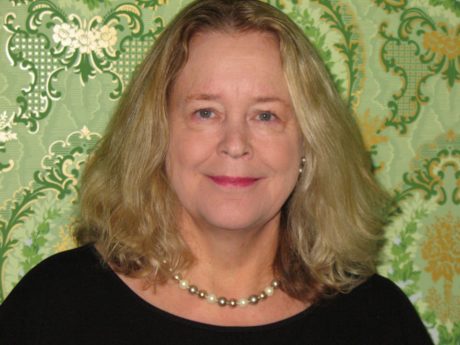
What’s up next at the Mansion?
Josh: Our annual “Murder Mystery” – which is staged throughout the house and which the audience has to solve – will be Death Takes a Curtain Call. It’s about a troupe of actors performing Sweeney Todd, when things go very wrong. A murder will occur during the show, not before, so it’s a little different than the others we’ve done; the audience won’t have to figure out which room was the scene of the crime, they’ll be in it when it happens. Then in the spring of 2018, we’re doing The Mousetrap by Agatha Christie. It’s site-specific, though not Victorian; it was first performed in London in 1952, but it has ties with the Mansion’s history.
Megan: We’re both in The Mousetrap, so we’re looking forward to that.
Molly: Josh is our rock. He’s an actor’s director. He has a vision, and he’s always communicating. He steers you, but he also welcomes collaboration; he’s the encouragement I’ve needed. But above all, Josh is a storyteller.
Megan: Any time Josh or Diane calls, we’ll be there!
Diane: That will be for Josh’s tenth anniversary here. We also have a fundraiser coming up this September, the “Magnificent Maxwell Affair,” at the private home of a former member of our Board of Directors, in Chestnut Hill. It will feature 19th-century piano music and a tour of select rooms inside Mark and Jeanette Turnbull’s fabulous residence.
Thanks to all of you for inviting me to your rehearsal and giving our readers an inside look at the work you do.
Victorian Theatre at Ebenezer Maxwell Mansion offers audiences the authentic experience of seeing period pieces staged in a meticulously-restored setting from the era. A reception is included with admission, so for the price of a ticket, you get to enjoy an intimate performance of a classic work, a visit to an historic property, and a conversation with the staff and fellow audience members over complimentary snacks and beverages. It’s a wonderful way to spend an afternoon or evening.
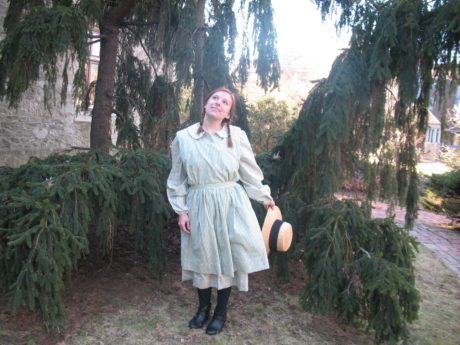
Anne of Green Gables plays through Sunday, May 7, 2017, at the Ebenezer Maxwell Mansion – 200 West Tulpehocken Street, Philadelphia, PA. For tickets, call (215) 438-1861, or purchase them online.



